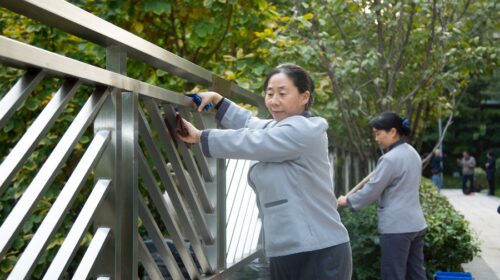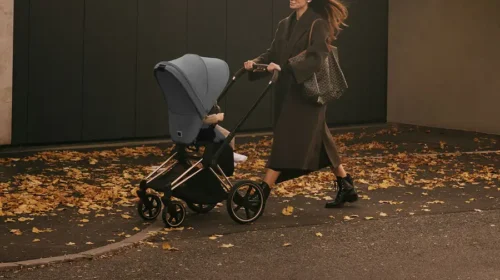KE Holdings shores up its house with share buybacks, as revenue gains fail to impress

China’s largest real estate brokerage has spent $2.3 billion on share repurchases in the last three years as a struggling property market weighs on its profits
Key Takeaways:
- KE Holdings reported its profit tumbled 36% year-on-year to 747 million yuan in the third quarter
- China’s leading property brokerage has spent $675 million on share repurchases so far this year
By Lau Chi Hang
The ancient adage says that “When the nest overturns, no egg is left unbroken.” Such wisdom perfectly captures the stream of carnage that shows no signs of easing in China’s ailing property market, plagued by anemic sales and falling prices that are causing pain for even the best-run giants like leading real estate broker KE Holdings Ltd. (2423.HK; BEKE.US).
The company’s income has continued to rise over the last two years, even as falling commissions in the slumping market take a bite out of its bottom line. Its revenue climbed 20.2% year-on-year to 93.5 billion yuan ($13.13 billion) in 2024, but its profit fell 31% to 4.08 billion yuan. Its top line continued climbing in the first half of this year to the tune of a 24% revenue gain to 49.3 billion yuan, yet its profit still fell 7% year-on-year to 2.16 billion yuan.
Now, even the company’s top line is looking weak, with revenue up just 2.1% year-on-year in the third quarter to 23.1 billion yuan, according to its latest financial report released earlier this month. Meantime, the profit erosion continued with a steep 36.1% year-on-year decline to 747 million yuan for the period.
KE’s fading fortunes come as China’s protracted property downturn keeps squeezing its core brokerage operations. While the total value of existing home transactions it facilitated rose 5.8% year-on-year to 505.6 billion yuan, revenue from that segment still fell 3.6% to 6 billion yuan. Meanwhile, its new home transaction value slumped 13.7% to 196.3 billion yuan, dragging down revenue for that segment by 14.1% to 6.6 billion yuan.
Shrinking commissions
A key culprit behind the shrinking brokerage business is falling commissions on several fronts, as KE lowers prices to try to keep its pipeline full of homes for sale. Such cuts include incentive-based fee waivers for its platform services, and lower franchise fees for its affiliated stores and agents. At the same time, KE is paying employees more at its core Lianjia brand of shops to retain talent. What’s more, cash-strapped developers are demanding lower commissions on new home sales as they continue to bleed nonstop red ink. That confluence of pressures has collectively taken a bite out of KE Holdings’ profit margins.
To combat such headwinds, the company previously rolled out a “one body, three wings” strategy to diversify its business. The “body” remains its core brokerage business covering existing and new homes, while the “three wings” encompass its more recent moves into home improvement, rental services and property development.
However, with the exception of a relatively solid showing from its rental business, the other two wings are hardly doing much lifting. Revenue from the home improvement business remained flat year-on-year at 4.3 billion yuan during the latest quarter. And with new home transactions declining, future growth in such services could face constraints.
Its property development business employs a consumer-to-manufacturer (C2M) model using big data for precise product positioning. Yet such development requires heavy spending, lengthy timelines, and only offers modest returns in such a weak market. The segment could also easily swing into the red should the property market remain weak for too long.
In the absence of much lift from the three wings, KE’s fortunes will remain heavily tied to its brokerage business for the foreseeable future. And with no recovery in sight for the property market, its shares are coming under nonstop pressure. A strong rally for the Hong Kong stock market this year has completely bypassed KE Holdings, whose shares are now down about 40% from their high over the last 12 months.
Big buybacks
To buoy its stock, KE has turned heavily to share buybacks since September 2022. Through the end of September this year, it had repurchased about $2.3 billion worth of its stock, equal to about 11.5% of its float before the buyback program. The company has repurchased $675 million worth of its shares this year alone, including $281 million in the third quarter – its highest quarterly outlay in nearly two years.
Yet buybacks alone can only treat the symptoms. To support its stock over the longer term, the company will need to show operational improvement. But that looks unlikely in the current comatose property market. Despite that, KE Holdings’ Hong Kong-listed stock has oscillated in a relatively narrow band between HK$30 and HK$50 in recent years, showing the share buybacks may be providing at least some stability.
Not surprisingly, analysts are quite bearish on the company. UBS recently slashed its 2025–2027 profit forecasts for KE by 24%, 29%, and 27% respectively. It also downgraded its recommendation on the stock from a “buy” to “hold” and cut its target price for the company’s U.S.-listed shares by 14% to $19 from $22.10.
Patience required
Even after its stock declines, KE Holdings still trades at a relatively high forward price-to-earnings (P/E) ratio of 34 times, and its trailing ratio is even higher at 39 times. Such a premium means that any upside to its share price could be unrealistic in the near term, with the exception of occasional pops from new government policies aimed at stabilizing the market. Long-term recovery for both the company and its stock will only come when the sector rebounds.
That said, KE Holdings has been relatively resilient since the property market peaked in 2021 compared with others from the sector. Despite the occasional loss, its overall performance has held up reasonably well. Even with its recent profit declines, the company’s ability to keep boosting revenue shows it continues to gain market share, even if that’s coming at the expense of falling commissions and profits.
KE Holdings’ ability to stay profitable through all the adversity, coupled with its strong balance sheet, should position it well to weather the downturn, and thus it stands to reap big benefits once the market recovers. Its long-term value is obvious. The big question now is when China’s real estate sector will finally reach bottom – be it in two years, five years or perhaps even longer.
To subscribe to Bamboo Works weekly free newsletter, click here






